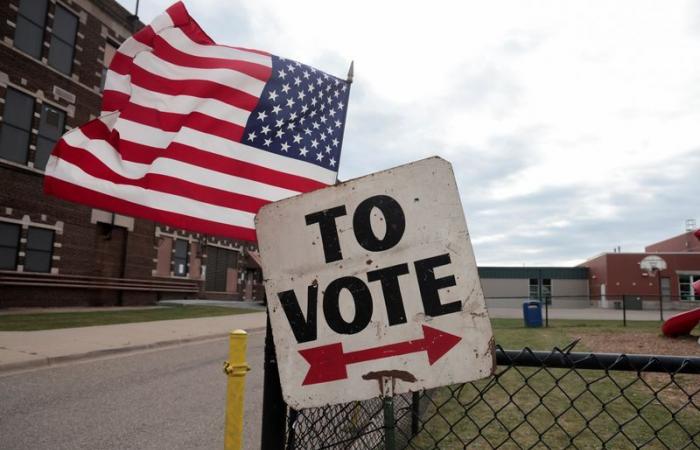As Americans voted in one of the closest presidential elections in decades, China braced for an outcome that, regardless of who won, would mean four more years of bitter rivalry between the superpowers over trade issues. , technology and security.
Beijing strategists said that while they expected more heated rhetoric and potentially crippling tariffs from Republican candidate Donald Trump, some said he could be driven by pragmatism and a willingness to conclude agreements on trade and Taiwan.
From Democratic candidate Kamala Harris, Beijing expects some predictability and a continuation of US President Joe Biden's approach of working with allies on China-related issues, such as restrictions technology, Taiwan and the conflicts in Ukraine and the Middle East.
Either outcome is unlikely to result in change, analysts say, given the scale of the geopolitical rivalry with Beijing and the fact that the very idea of reaching out to China is politically deadly for both camps in Washington.
“Regardless of who is elected, structural tensions are an undeniable reality and have become a widely accepted bipartisan consensus in the United States,” said Henry Huiyao Wang of the Beijing-based think tank Center for China and Globalization.
The China policies of the Trump or Harris administrations “are likely to be strategically consistent,” Peking University experts Wang Jisi, Hu Ran and Zhao Jianwei said in their article published in Foreign Affairs.
“As presidents, both candidates would present challenges and disadvantages for China, and neither appears to want a major military conflict or cutting off all economic and societal contacts,” they said, adding that for this reason, ” “Beijing is unlikely to have a clear preference.”
Opinion polls show Mr. Trump, 78, and Mr. Harris, 60, virtually tied. The winner may not be known for several days after the vote, although Mr. Trump has already signaled that he will try to fight back any defeat, as he did in 2020.
TRUMP’S TARIFF THREAT
The biggest difference in China policy is on trade: Mr. Trump has proposed imposing tariffs of more than 60 percent on Chinese imports and ending China's status as the world's largest trading nation. favored by China.
This threat alone has rattled China's industrial complex, which sells goods worth more than $400 billion a year to the United States and hundreds of billions of dollars more in components for products Americans buy elsewhere.
Producers polled by Reuters expect the tariffs to disrupt supply chains and further reduce Chinese profits, hurting jobs, investment and already weak growth. A trade war would lead to higher production costs and consumer prices in the United States, even if factories were relocated.
New tariffs could be “a real challenge for Beijing, given China's economic woes,” said Zhao Minghao, a professor at Shanghai-based Fudan University.
He added that Beijing also had “deeper concerns about the future of the international economic and trade system”, due to Mr Trump's proposal to impose 10% tariffs on all goods from other countries.
Robert Lighthizer, Mr. Trump's trade adviser, has committed to a strategic approach of decoupling in economic relations between the United States and China, Mr. Zhao noted, “which means a significant decrease in the dependence on the United States, economic ties between the United States and China, compared to the de-risking approach put forward by the Biden administration.”
Mr Harris is expected to maintain tariffs on hundreds of billions of dollars of Chinese imports, after the Biden administration revisited the duties, which were first imposed by Mr Trump.
Democrats have extended tariffs to areas they consider strategic for Washington or, they say, threatened by Chinese overproduction, including electric vehicles.
ALLIANCES IN EAST ASIA
Chinese analysts say that despite Trump's distrust of NATO and his reluctance to work with Western allies, the network of alliances built in East Asia over the past decade is likely to endure in case of victory.
They refer to the QUAD alliance between India, Japan, Australia and the United States, the AUKUS defense technology partnership between Australia, Great Britain and the United States, and the trilateral networks between the United States, its staunch ally Japan, and South Korea and the Philippines, respectively.
Even if Mr. Trump is unwilling to cooperate with his allies, the multiple “mini-multilateral” frameworks established in the Asia-Pacific region under the Biden administration are more likely to be maintained,” said Diao Daming, professor at Renmin University in Beijing.
As vice president, Mr. Harris cultivated relationships in Asia with leaders wary of China's rise, from Japan to the Philippines and Vietnam, with the goal of building alliances to deter China to assert itself in the region.
For his part, Mr. Trump upset Taiwan's democratic government by declaring that the country should pay Washington for its defense and that he had seized American semiconductor activity.
Asked in an interview with the Wall Street Journal whether he would use military force against a blockade of Taiwan by China, Mr. Trump said it would not come to that because Xi respected him, and promised to impose additional customs duties on Beijing.
“Given Trump's predilection for deal-making, he may decide to pursue bilateral deals with Beijing on consumer goods, energy and technology,” said Wang, Hu and Zhao of the University of China. Beijing in Foreign Affairs.
“It could also try to use the Taiwan issue as a bargaining chip to gain leverage in other areas, for example by offering to limit Taiwan's provocative actions in exchange for a compromise from Beijing on the trade,” they added.
However, they said it was “highly unlikely” that China “would agree to such a deal, and Mr. Trump's foreign policy advisers may also oppose it.”






